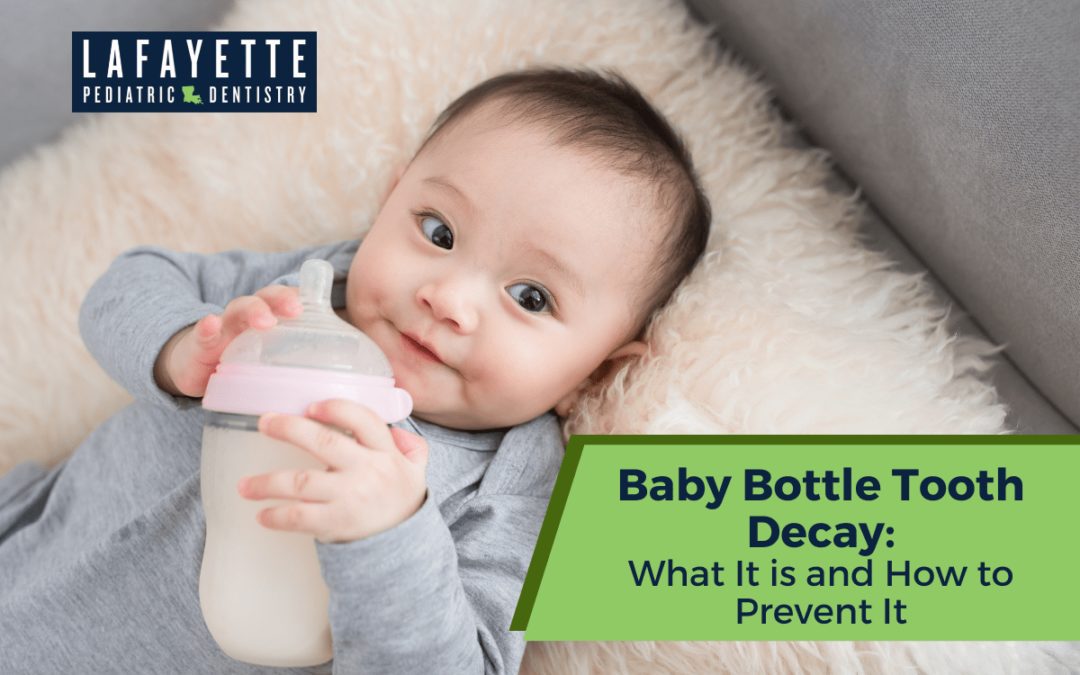Are you a new parent trying to navigate the ins and outs of taking care of your baby’s teeth? If so, have you heard of baby bottle tooth decay? In this post, we’ll discuss everything you need to know — from what it is and how it affects infants and young children to tips for prevention.
Here’s why paying attention to baby bottle tooth decay now will benefit both you and your child in the long run.
What is Baby Bottle Tooth Decay?
Baby bottle tooth decay refers to cavities that occur in the baby teeth of infants and young children who take a bottle to bed. The term is misleading: early tooth decay can be caused by taking a sippy cup to bed as well!
The insulting factor is the drink contained inside, and not necessarily the bottle or cup itself, so a better name for this type of decay is “early childhood decay.”
The enamel, or outer layer, of baby teeth is thinner than that of permanent teeth, making them more susceptible to tooth decay. While early childhood decay primarily affects the upper front teeth because the nipple or spout contacts these teeth the most, it can also affect other teeth.
There are several factors that can cause baby bottle tooth decay:
- Prolonged exposure to sugary drinks. Cavities are caused by bacteria that feed on leftover sugar in the mouth. The constant exposure to these substances, especially during prolonged nighttime feeding or allowing the child to sleep with a bottle, creates a breeding ground for bacteria that produce acids. This, in turn, leads to the formation of cavities.
- Bacteria passed from other people. Cavity-causing bacteria can be passed from person to person through saliva. If you or other adults put a pacifier or a spoon in your mouth before giving it to your baby, you can pass on these bacteria, which increases their risk of tooth decay.
Signs of Early Childhood Tooth Decay
The first sign of tooth decay is typically the presence of chalky white spots along the gum line of the affected teeth. If left untreated, over time, these spots can progress to an early cavity, which appears as light brown spots on the tooth. If the cavity becomes deeper, it may turn dark brown or black.
How to Prevent Early Childhood Tooth Decay
Fortunately, there are several simple yet effective strategies to prevent baby bottle tooth decay as well as promote good oral health in infants and young children.
- Never let your child go to bed with a bottle or sippy cup containing milk, juice, or any other sugary liquid. This prevents harmful bacteria from forming plaque on your child’s teeth, which leads to cavities. Water is the only liquid your child should have after nighttime brushing is complete.
- Refrain from putting anything in your baby’s mouth that has been in your own mouth or someone else’s. This includes cleaning a pacifier with your saliva or sharing eating utensils when feeding your baby.
- Avoid dipping your baby’s pacifier in honey or anything containing sugar.
- Once your child’s teeth start erupting, practice good oral hygiene by brushing with a soft-bristled toothbrush and a tiny smear of fluoride toothpaste twice a day.
- Once your child reaches one year of age, encourage them to drink from a regular cup.
- Limit your child’s consumption of sticky, sugary drinks and snacks, such as candy, gummies, fruit juices, and sweetened beverages. Instead, promote healthy snacking on items like cheese, whole fruit, yogurt, and whole grains.
- Consult a pediatric dentist by the first birthday or as soon as your child’s first tooth appears in order to detect and treat problems early.
Read also: The 5 Most Common Causes of Cavities in Children
Why is It Important to Keep Baby Teeth Healthy?
Some parents might wonder why they need to keep their child’s baby teeth healthy since they will lose them anyway. Baby teeth play a crucial role in the development of permanent teeth, so they should be cared for just like permanent teeth.
For instance, if a baby tooth falls out due to tooth decay, it will create a gap in the mouth, causing nearby teeth to shift and potentially affect the positioning of incoming permanent teeth, which can lead to dental crowding.
Additionally, a baby tooth with a cavity can cause pain or infection in your child’s mouth. An infection can damage the permanent tooth underneath. Untreated cavities in baby teeth can also lead to problems with chewing and with your child’s teeth aligning correctly.
Furthermore, if a decayed baby tooth needs to be extracted, the procedure can cause discomfort for your child. You can also visit our post to learn more about baby teeth and how to properly care for them.
To sum up, baby bottle tooth decay is an important issue to consider for parents with infants and young children as it could result in long-term oral health problems. Early detection and treatment are key, but prevention is the best solution. The strategies mentioned above can help prevent cavities in your child’s baby teeth to ensure their teeth remain healthy from infancy onwards.
Finally, if you’re seeking a kid’s dentist near you in Lafayette, LA, please don’t hesitate to contact us at Lafayette Pediatric Dentistry with any questions or concerns you have, or to book an appointment. With our extensive experience and expertise in pediatric dentistry, we can work together to achieve healthier smiles for your little one!
Sources:
https://www.mouthhealthy.org/en/all-topics-a-z/tooth-decay-with-baby-bottles
